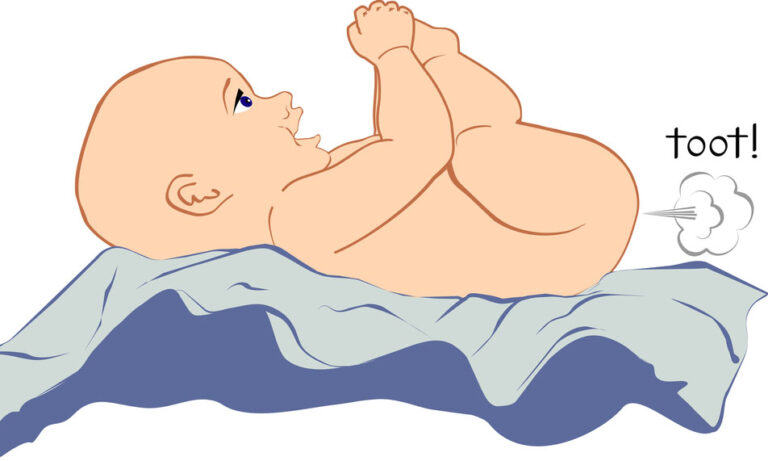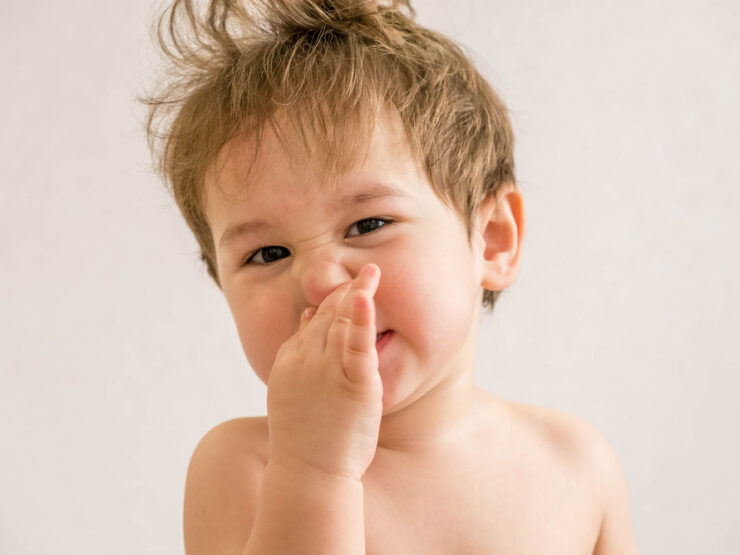Babies are naturally gassy. They burp, fart, and poop. They release gas more than adults do. In fact, most of the babies fart on an hourly basis. That’s a lot of farting, don’t you think? What could be the reason behind this?
A baby’s digestive system is still developing. The food she takes may not be broken down properly as her digestive system is still learning its function. It’s still trying to cope up with the demands of her body to efficiently move the food through. This results in extra gases being trapped in the baby’s intestines and this is why your baby farts excessively.
Most of the babies are gaining weight fast because they feed a lot. This is just normal because babies need to grow and they need all the nutrients they can get from their food. They actually gain about 140 to 200 grams each week so it’s no surprise that they want to be fed a lot. As they grow, their appetite increases as well. And it goes on.
Aside from regular growth, there are other reasons to consider why your baby has excessive gas resulting in farting so much.
Other culprits are the intake of extra gas while breastfeeding, drinking formula with air bubbles, drinking too quickly or too slowly, and crying for extended periods. If you already started your baby with solid food and other liquid like citrus juices, then, that could also be one of the reasons for the extra gas.
Other Reasons Why A Baby Farts Excessively
Growing digestive system
Remember that your baby still has an immature digestive system. It’s still in the process of learning to function and the proper rhythm of digesting so that food will move through efficiently.
If your baby feeds, her tiny digestive system doesn’t even down the food properly resulting in gases to be trapped in her intestines. The extra gases will be released in form of farts and burps. As your baby gets older, she’ll be able to digest food better and this situation will be corrected.
Bacterial imbalance in the body
Babies are born with clean guts. That being said, it means they don’t have probiotics (beneficial bacterial flora) yet.
These probiotics consist of good bacteria that will help process the nutrients from the food that babies eat. Give your babies a few months to properly digest their food (breast milk or formula) and the excessive farting will eventually stop.
A research in the Netherlands concluded that babies have a higher number of “Proteobacteria” which produces gas causing pain. This bacteria causes gas formation which will result in excessive crying and farting.
But once your baby picks up “good” bacteria from the (breast) milk, she moves on from this phase and gets moving with the development of her system.
Incorrect breastfeeding postures or feeding techniques
Breastfeeding does not go well at first for some moms. This is a skill that is learned over time. The same goes for babies. They will end up swallowing too much air if they latch poorly or have a hard time keeping up with too much supply of your milk.
If this is the case for you, try switching breasts every now and then while you are feeding. You can also try different positions, where both of you can be comfortable while breastfeeding. Just make sure to place your baby’s head higher than her stomach.
If you are bottle-feeding, try checking the artificial nipple that’s not too fast or too slow flowing. It can also help if you will position your baby in a vertical angle. Doing this will regulate the flow of milk into their mouth without collecting a lot of air while feeding. After feeding, do not forget to burp your baby.
First solid feed
Parents get excited to feed their babies their first solid food. Who wouldn’t be? But this can actually cause babies to become gassy since their digestive system only got used to milk. This will then require their system to work more and lead to the release of gas after the feeding.
You also need to carefully choose the food that you are feeding your baby. There are foods that are harder to take and digest for them.
Ceaseless crying
The outside world can be extra challenging for babies. They got used to the comfort and warmth inside their mother’s womb that they become overwhelmed with the changes after they have been given birth.
All of this may cause discomfort to babies that will lead them to incessant crying. And crying causes gas to enter their bodies resulting in excessive baby farts. Attend to their needs immediately to avoid the drama!
Like mother, like daughter (and son)
If you are gassy, then most probably your baby is gassy, too! If you are breastfeeding, there is a possibility that the food you eat may be passed on to your baby via your breast milk.
If you are fond of eating garlic, egg, asparagus, Brussel sprouts, beans, potatoes, rice, bread, and other starchy food then these may be causing your baby’s farts to stink. If you are too worried, change your diet and stop eating these foods for at least 3 days and see if it changes your babies farting patterns.
Use of antibiotics
If your baby is under medication, this may also cause to excessive farting because antibiotics often terminate microflora in their intestines. If you are taking antibiotics, you can pass that on to your baby by breastfeeding. This can also cause your baby to become gassy.
This is something you shouldn’t be worried about. This is still considered normal and after going through this, your baby’s digestive system will be strengthened and more developed.
Should I Be Worried That My Baby Farts So Much?
Being gassy for babies are normal because they are still working on developing their digestive system. And farting is a normal reaction to this. If she farts a lot, it doesn’t mean that something is wrong. It could just mean that she is gassy and she is releasing the extra gas through farting.
These are some indicators when your baby has excessive gas:
- Bloated tummy/ Hard tummy
- Excessive burping and farting
- Incessant crying
- Belly cramps (you’ll know when she cries if you press her tummy)
- This might give discomfort to your baby but this is just normal. Her digestive system will be developed as she grows older.
What Can I Do To Relieve My Baby’s Gas?
- Work it out – Help her to perform the “bicycle” exercise by gently lifting her feet to her stomach. Repeat this exercise as often as needed.
- Check the feeding position – An expert says to place the baby’s head higher than your stomach when you are feeding so the milk sinks to the bottom of the stomach. This will make it easier to burp your baby. If your baby is bottle-fed, make sure not to shake the bottle too much to avoid air bubbles.
- Burp your baby – Burping your baby is highly suggested during and after every feeding sessions because this is the easiest way to ease gas pains. If she doesn’t burp right away, you can lay her on her stomach and gently pat her back to help her release the extra gas.
- Check the equipment – check the artificial nipple and see how the milk is flowing. Change it when it’s too fast flowing because your baby may swallow a lot of air if not regulated.
- Examine your menu – If you started to feed your baby with solid food, then, watch out for the list. There are certain kinds of foods that are harder to digest and are known to cause excess gas.
- Tummy time – Give your baby her tummy time. This is best when your baby has started to learn how to roll over. This will not only help her discharge the extra gases but also encourages her to work on her muscles. This is a good exercise for our little ones!
If you are still breastfeeding, you still need to watch out for your diet, too. There is a possibility that your baby consumes that also through your breast milk.
Related Questions
Is it normal for babies to be gassy?
Yes, it is normal for babies to be gassy for one reason: their digestive system is still immature. Their foods are not even down as expected that cause gases to be trapped in their tiny intestines resulting in gassy babies.
Do babies fart a lot?
Yes, this is normal and a natural occurrence. Babies are very vulnerable to swallowing extra gases while nursing and crying. And they release the gas through burping and farting. So, you should get used to those little sounds coming from your baby’s cute butt.
How can I relieve my baby’s gas?
There are several ways to help your baby release extra gases. Here are some tips that you can follow:
- Burp your baby during and after the feeding session.
- Make sure that you place her head higher than her stomach while feeding.
- Help her with an exercise called “bicycle” exercise.
- Check the artificial nipple of your baby’s feeding bottle and change it if necessary.



